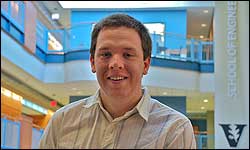Timothy Ault, a doctoral student in environmental engineering, has won a three-year $150,000 fellowship from the Department of Energy’s Office of Nuclear Energy to support his studies at Vanderbilt.
This is a multi-year agreement that will be the funding vehicle for this and any future Nuclear Energy Scholarship or Fellowship winners from Vanderbilt.
These fellowships are part of a larger effort by the DOE to build on President Obama’s commitment to promote education in the areas of science, technology, engineering and math. The awards announced under the DOE’s Nuclear Energy University Programs will support nuclear energy research and development and student education at 46 colleges and universities around the country.

In addition, Ault, who also has an IBM Graduate Fellowship, has been awarded a First Place prize in the 2014 DOE’s Innovations in Fuel Cycle Research Awards competition. Ault’s award is in the Open Competition in the category of Energy Policy.
His award-winning research paper, “Potential Synergy: The Thorium Fuel Cycle and Rare Earths Processing,” was presented at the GLOBAL International Fuel Cycle Conference in October 2013. The program awarded 20 prizes in 2014 for student publications and presentations relevant to the nuclear fuel cycle. In addition to cash awards, award-winning students will have a variety of other opportunities.
“The Department of Civil and Environmental Engineering has extensive ties to many of the nation’s elite government and industrial agencies. I’ve already met some of the field’s superstars. The possibilities for networking are endless,” Ault said.
In addition to his research in environmental and radiological impacts of thorium fuel cycles, Ault’s other areas of interest include nuclear fuel cycles, radiological risk assessment, chemical and other non-radiological impacts of nuclear processes, mining and other front-end nuclear operations, nuclear waste management.
Ault earned a BS degree in chemical engineering and nuclear engineering from the University of California, Berkeley, in 2012.
“Vanderbilt’s Nuclear Environmental Engineering track is truly one-of-a-kind among universities. As an undergraduate, I became passionate about both the nuclear industry and environmental problems, but I found it difficult to reconcile my interests. However, Vanderbilt has remarkably integrated these two fields, providing a uniquely environmental perspective on traditional nuclear problems,” Ault said.
Vanderbilt has developed a Nuclear Environmental Engineering (NEE) sub-specialty within in its Ph.D. program in environmental engineering. James H. Clarke, professor of the practice of civil and environmental engineering, and Steven L. Krahn, professor of the practice of nuclear environmental engineering, are NEE co-directors and advisers to Ault.